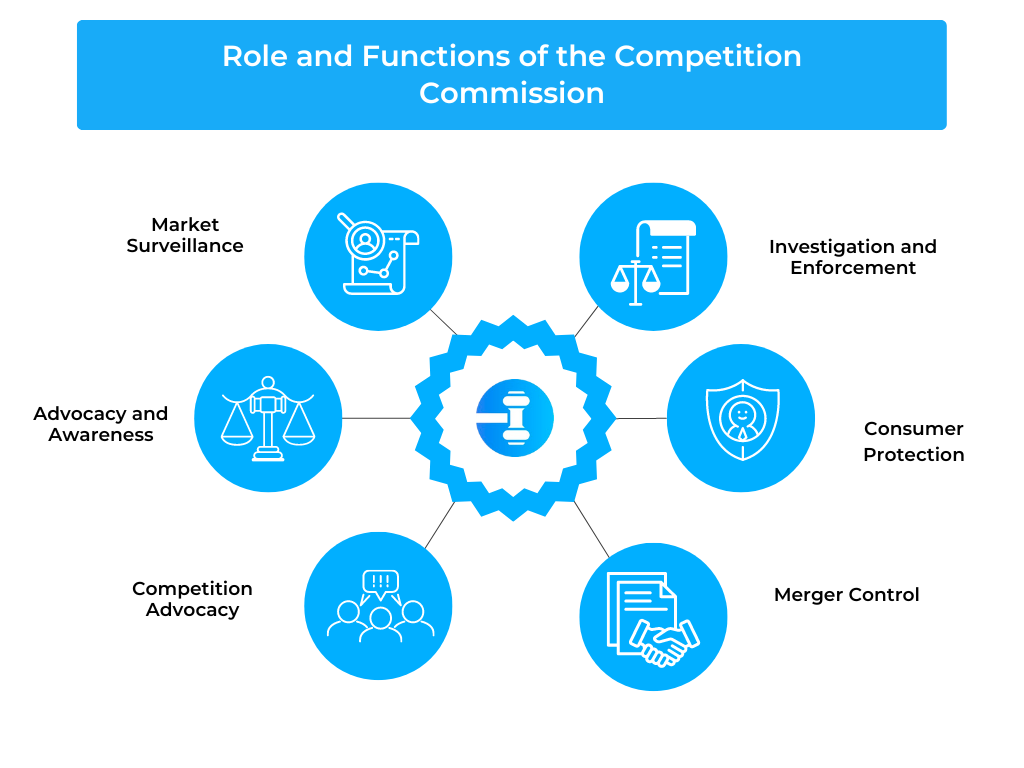Competition Commission of India

The Competition Commission of India (CCI) is a statutory body established under the Competition Act of 2002. It serves as the country’s primary regulatory authority for promoting and sustaining fair competition in the market. The CCI is entrusted with the responsibility of preventing anti-competitive practices, regulating mergers and acquisitions, and advocating competition in various sectors of the economy. Through its enforcement, advocacy, and awareness initiatives, the CCI aims to create a level playing field for businesses, protect the interests of consumers, and foster a competitive environment conducive to innovation, efficiency, and economic growth.
Legal Framework and Jurisdiction of the Competition Commission
The Competition Commission of India operates within a robust legal framework established by the Competition Act of 2002. The Act empowers the Commission to investigate and address anti-competitive practices, abuse of dominant position, and combinations that may have an adverse impact on competition. The CCI has the authority to scrutinize mergers and acquisitions to ensure they do not result in a significant reduction of competition in the market. It has jurisdiction over all sectors of the Indian economy, including public and private enterprises, and it actively promotes fair competition and consumer welfare. The CCI’s jurisdiction extends to both domestic and international transactions that have an impact on competition in India.
Role and Functions of the Competition Commission

The Competition Commission of India (CCI) plays a crucial role in promoting and sustaining competition in the Indian market. It is responsible for enforcing the provisions of the Competition Act and ensuring fair competition practices. The key functions of the CCI include:
- Investigation and Enforcement: The CCI investigates alleged anti-competitive agreements, abuse of dominant position, and anti-competitive mergers and acquisitions. It has the authority to impose penalties and take corrective measures to address anti-competitive practices.
- Market Surveillance: The CCI monitors markets to identify potential anti-competitive behavior and conducts market studies to assess competition dynamics, market structure, and consumer welfare.
- Advocacy and Awareness: The CCI engages in advocacy efforts to raise awareness about competition law and policy. It promotes competition through educational programs, capacity building, and collaborations with stakeholders.
- Competition Advocacy: The CCI provides recommendations to the government on policies and regulations that impact competition. It actively participates in policy discussions to ensure a competitive business environment.
- Merger Control: The CCI reviews mergers and acquisitions to assess their potential impact on competition. It ensures that such combinations do not lead to a substantial lessening of competition in the market.
- Consumer Protection: The CCI protects consumer interests by addressing anti-competitive practices that harm consumer welfare. It takes measures to prevent unfair trade practices and promotes a competitive market for the benefit of consumers.
Promoting Competition: Investigating Anti-competitive Practices
The Competition Commission of India (CCI) plays a vital role in promoting competition by investigating and addressing anti-competitive practices. It scrutinizes agreements, abuse of dominant position, and mergers and acquisitions to ensure a level playing field in the market. By prohibiting anti-competitive agreements and preventing abuse of market power, the CCI fosters fair competition and protects consumer interests. Through evidence-based investigations and stakeholder engagement, the CCI makes informed decisions and imposes penalties or prescribes remedies when anti-competitive practices are established. Its efforts contribute to maintaining a competitive and dynamic business environment in India.
Merger Control: Ensuring Fair and Competitive Markets
Merger control plays a crucial role in ensuring fair and competitive markets. The Competition Commission of India (CCI) is responsible for examining and regulating mergers and acquisitions to prevent anti-competitive practices and protect the interests of consumers. The CCI evaluates proposed mergers to assess their potential impact on market competition and consumer welfare. Through this process, the CCI ensures that mergers do not result in the creation of monopolies or the abuse of market power. By scrutinizing mergers, the CCI promotes a level playing field, encourages innovation, and safeguards the interests of both businesses and consumers. This proactive approach to merger control fosters healthy competition, encourages market efficiency, and supports economic growth in India.
Advocacy and Awareness: Fostering a Culture of Competition
Advocacy and awareness initiatives are key aspects of the Competition Commission of India’s (CCI) mandate. By fostering a culture of competition, the CCI aims to educate businesses, consumers, and other stakeholders about the benefits of fair competition and the importance of compliance with competition laws. Through various outreach programs, seminars, and publications, the CCI raises awareness about anti-competitive practices, promotes fair market practices, and encourages a competitive business environment. Additionally, the CCI engages in advocacy efforts to influence policy reforms that support competition and remove barriers to entry. By actively promoting a culture of competition, the CCI strives to create a level playing field, encourage innovation, and drive economic growth in India.
Enforcement and Penalties: Deterring Anti-competitive Behavior
Enforcement and penalties play a crucial role in deterring anti-competitive behavior and ensuring compliance with competition laws. The Competition Commission of India (CCI) has the authority to investigate and take enforcement actions against entities engaged in anti-competitive practices. This includes conducting inquiries, gathering evidence, and imposing penalties for violations. The CCI has the power to impose fines, issue cease and desist orders, and even initiate legal proceedings in cases of serious violations. These enforcement measures serve as a deterrent to anti-competitive conduct and send a strong message that such behavior will not be tolerated. By effectively enforcing competition laws and imposing appropriate penalties, the CCI aims to protect and promote fair competition, safeguard consumer interests, and foster a competitive marketplace in India.
Challenges and Future Outlook for the Competition Commission of India
- Rising Complexity of Markets: The evolving business landscape presents challenges in identifying and addressing new forms of anti-competitive practices, requiring the Competition Commission to adapt and stay abreast of emerging trends.
- Cross-Border Jurisdiction: Dealing with cross-border transactions and international mergers raises challenges in coordinating efforts with global competition authorities and enforcing regulations effectively.
- Judicial Backlog: The backlog of cases in the Indian judicial system can delay the resolution of competition cases, impacting the timely delivery of justice and hindering the effectiveness of the Competition Commission.
- Awareness and Outreach: Continued efforts are needed to enhance awareness about competition laws and promote a culture of competition among businesses, consumers, and stakeholders.
- Digital Markets and New Technologies: The increasing influence of digital markets and emerging technologies introduces unique competition issues that require specialized expertise and proactive regulation.
- Capacity Building and Resources: Adequate resources and skilled personnel are crucial for the efficient functioning of the Competition Commission and to effectively handle the growing caseload.
- Strengthening Cooperation and Collaboration: The Competition Commission can benefit from strengthening collaboration with other regulatory bodies and competition authorities globally to exchange best practices and address cross-border competition concerns.
Conclusion:
In conclusion, the Competition Commission of India plays a crucial role in promoting fair competition, protecting consumer interests, and ensuring a level playing field in the Indian marketplace. Through its enforcement actions, merger control measures, advocacy efforts, and penalties for anti-competitive behavior, the Commission strives to foster a competitive and dynamic business environment. However, it faces challenges in addressing evolving market complexities, cross-border jurisdiction, judicial backlog, and the need for enhanced awareness and capacity building. Despite these challenges, the Commission remains committed to its mission and will continue to adapt and evolve to effectively regulate competition in the digital age and contribute to India’s economic growth and development.
Try our Debt Resolution solutions today Request a Demo